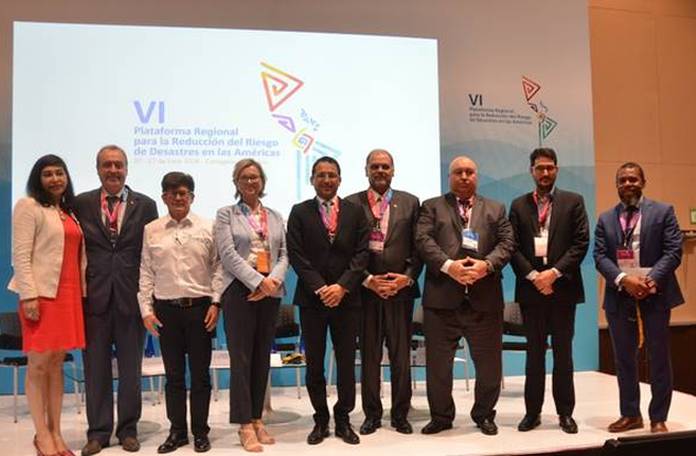CARTAGENA DE INDIAS, Colombia — The sixth regional platform for the reduction of natural risks in the Americas was held in Cartagena de Indias, Colombia, between June 20 and 22, 2018. This sixth edition brought together government agencies, representatives of the private sector, and members of civil society from the different states of the Americas and the Caribbean to exchange experiences and knowledge in the field of natural disaster risk management and the strengthening of resilience in the countries and communities of the region.
The event was inaugurated with a speech by the president of Colombia, Juan Manuel Santos, Nobel Peace Laureate, who highlighted the importance of building a shared strategy that allows all the states of the Americas and the Caribbean to reduce the vulnerability of communities and minimize the risks and consequences of disasters.
Santos also called on all American and Caribbean nations to promote resilience and be prepared for the impact that disasters and the effects of climate change can cause.
The sixth edition of the regional platform for natural hazard reduction in the Americas also included the participation of the representatives of the natural disaster risk management program in the CARIFORUM countries (NDRM – CARIFORUM). This initiative of the African, Caribbean and Pacific States (Intra ACP), funded by the European Union (EU), aims to contribute to the reduction of vulnerability to the impacts caused by natural and man-induced hazards and the effects of climate change in the communities of the CARIFORUM member countries.
On this opportunity, the NDRM-CARIFORUM was represented by the implementing partners of the program: the Caribbean Disaster Emergency Management Agency (CDEMA), the Caribbean Development Bank (CDB) and the government of the Dominican Republic, who took the opportunity to exchange good practices and experiences learned in terms of training and strengthening resilience in the face of disasters in the different communities of the Caribbean countries.
The delegation of the government of the Dominican Republic was headed by Colonel José Alcántara, national deputy director of the civil defense of the Dominican Republic, who participated as a panelist during the platform, stressed that disasters know no borders and therefore justifies the design of a common management strategy and policy of risks that allow for strengthening the resilience of the people.
The platform was also attended by the ambassador of the European Union in Colombia, Doña Patricia Llombart, who emphasized the importance of these types of meetings to “know which are the priorities of the region and strengthen multilateral action on issues of preparation for disasters”.
Also, within the framework of this event, the European Union held a two-day workshop with regional experts to define the priorities that will guide cooperation in disaster risk management in Latin America and the Caribbean by 2019. The workshop was organized by the European Commission, (ECHO) and the United Nations Office for Disaster Risk Reduction (UNISDR).
Representatives of humanitarian organizations from different countries of the region participated in these workshops. Noteworthy was the intervention of Ronald Jackson, executive director of CDEMA, who highlighted that the best way to promote functional cooperation among the different regional actors is based on the principles of solidarity and teamwork. He also referred to the importance of strengthening monitoring and training to improve disaster response mechanisms at the regional, national and local levels.


